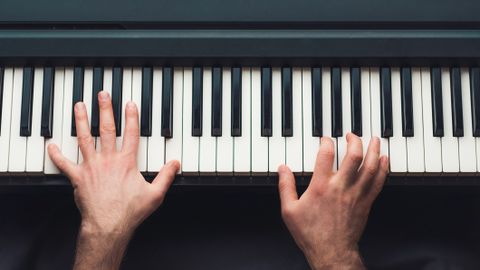Playground Sessions review: What is it?
Co-founded by iconic US music producer Quincy Jones, Playground Sessions is a subscription-based online piano lessons service aimed primarily at beginners. A multi-platform solution designed to work with PCs, Macs and mobile devices, it’s built around the bespoke ‘Playground Sessions for Piano’ app that users download and install onto their chosen device when signing up for an account.
Price: 7 day free trial, 1 month $24.99, 12 months $149.99/Lifetime $349
System: iOS, Mac, PC
Courses: Bootcamps: Rookie, Intermediate & Advanced, Additional Bonus Courses
Format: Interactive lessons, some with introductory video, song library
Song Library: Over 2,000 songs, unlimited free access to subscribers
Subscribe: Playground Sessions
At this point, you can opt to dip your toe (or fingers) into the water by means of a 7-day free trial period, to help you decide if the service is right for you. Should you go on to take the plunge, the price plans include Monthly ($24.99 per month), Annual ($149.99 per year) or Lifetime ($349) options.
The app works best with a MIDI or Bluetooth connection, so you’ll need a MIDI-equipped digital piano or controller keyboard to use the full service. Unlike some of its peers, there’s no audio-based note-recognition feature, so if you want to use the app with an acoustic piano (which many do), while you can still use the step-by-step lessons, arrangements, backing tracks, printable sheet music and other features, you won't be able to access some of Playground Sessions' interactive or gamified elements such as instant feedback or progress tracking.
We reached out to Playground Sessions about the lack of note recognition, and this is what they said. "We've found that pitch detection technology often fails to measure rhythm accurately, and many competitors don’t measure rhythm at all, only pitch. Additionally, this technology struggles with polyphonic pitch detection, such as when both hands are playing chords. As educators, we prioritize accurate feedback for our users, avoiding the risk of inaccurate readings and measurements, which is why we have not yet implemented pitch detection. All competitors recommend a MIDI connection for enhanced accuracy".
If you don't already have a compatible keyboard lying around, the Playground Sessions web store has several options and bundles available - including popular Casio and Yamaha models - that can be purchased alongside a subscription.
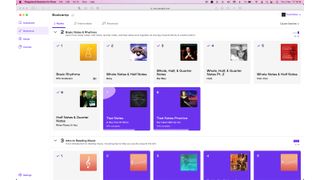
A Bluetooth MIDI connection is supported if your keyboard is equipped with it, but if not, you’ll need to have the right cable to hand. To test the iPad version of the app, for instance, we had to source an elusive USB-B to lightning cable from Amazon in order to hook the iPad up to our Novation MIDI controller keyboard.
Once installed, you open the app, enter your login details and then you’re away. As you proceed through the content, the service requires an active internet connection in order to download individual lessons, upload your performance scores to the server and allow connection of your account to your chosen social media profile to keep your family and friends informed of your progress.
The computer version of the software sports an updated interface which is more inline visually with the iPad and iPhone apps, a big improvement on what was there in the previous incarnations we’ve used. It’s good to see the interface unified across all available platforms, as this is bolder, brighter and much easier to use than before.
Playground Sessions review: Performance & verdict
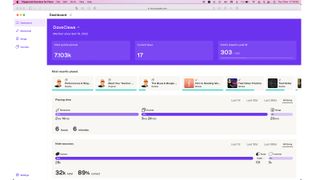
The app is navigated via four tabs accessible from the upper left corner of the main screen - Dashboard, Bootcamp, Songs and Courses.
The Dashboard is your home base, where you can find a concise summary of all your account details, progress statistics and most recently played lessons and songs. This is also where you can alter parameters like piano and metronome volume and change MIDI keyboard controller settings.

Pianote - Whether you’re totally new to the piano or a more advanced tinkler, Pianote's well-structured array of high-quality content is definitely well worth exploring.
Flowkey - Offered as a free trial with most new Yamaha keyboards, this incredibly intuitive app is well designed, well presented and perfect for beginners and returning pianists.
Simply Piano - Fast and fun app-based way to learn piano with a game-like interface that works with any piano or keyboard
The Bootcamp constitutes Playground Sessions’ main curriculum, of which there are three levels - Rookie, Intermediate and Advanced. This is where you get the basics down, and as such the spread of lessons is definitely more beginner-focussed, with a total of 92 Rookie lessons, 66 Intermediate lessons and 31 Advanced at the time of writing.
The lessons in each of the three levels are subdivided into small, focused groups, each with a clearly-stated learning objective. As users progress, each completed group unlocks a surprise song lesson that encompasses the theory and techniques contained within that group and demonstrates a practical application of it.
The Rookie stage is aimed at absolute newbies with no musical experience, and starts with entry-level subjects such as navigating the keyboard, naming the keys and introducing the basics of sight-reading. From there, the Intermediate level introduces chords and different rhythms, while the Advanced Bootcamp includes topics such as improvisation, complex voicings and arpeggios.
A particular highlight of this section is 22 lessons in theory and technique by David Bowie’s long-serving session pianist, Mike Garson
Lessons are broken down into small, easily-digestible chunks to help you steadily advance towards the goal task for each, whether it’s introducing you to chord inversions or teaching you to play ‘Hey There Delilah’. Although the lessons are designed to be worked through in consecutive order, users have complete freedom to jump about between lessons or even between skill levels - for instance, you don't have to complete the Rookie level before sampling lessons from the Intermediate level, so your progression needn't be totally linear.
Alongside the Bootcamp lessons, users also have full access to the recently expanded Courses section of the software. This library of topic-specific lessons supports the Bootcamp content by delving deeper into more niche areas like accidentals, scales and chord practice. A particular highlight of this section is the 22 lessons in theory and technique by David Bowie’s long-serving session pianist, Mike Garson, which are full of insights and tips from a career spanning 50 years at the forefront of the pop industry.
Going for a song
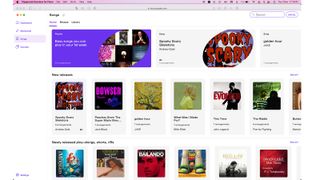
Once you have the basics down, the online song library found under the Songs tab allows you to build up your repertoire by streaming songs so you can learn to play your favourites. All users now receive free, unlimited access to the entire song library, which at the time of writing contains over 2,000 popular songs and is constantly being updated. Thankfully, the previous system of five free songs per month and a $1.99 fee for downloading additional songs is now a thing of the past.
In another major upgrade from previous iterations of the app, the library is also searchable on all platforms, making it far easier to find the song you’re looking for.
Users can search by artist, song title, level, genre or lesson type to browse through full songs, short riffs, and play-alongs arranged at various difficulty levels. This search feature alone is a gamechanger, especially since every song in the library comes with its own professionally-arranged backing track to play along to. The arrangements themselves are mostly very good, although not all the content is in the original key and some songs have been abridged or adapted to make them easier to play.
Lesson performance
Many of the Bootcamp lessons are built around elements of popular songs to demonstrate principles of basic music theory in a fun and practical way. For example, in one lesson the melody from Taylor Swift's 'Blank Space' is used as an example to teach how to play sixteenth notes.
Introductory videos to explain the idea or technique covered in the lesson are plentiful, after which you get a series of interactive scores to play along with, with an accuracy score flashed up at the end of each section. As you play along, each correct note on the score turns green, and if you get a note wrong it turns red. The accuracy threshold to complete each section and proceed to the next stage is 80% or more, so each stage presents a decent challenge.
Although a heavy reliance is placed on sight-reading from the outset, there’s still plenty of interest here if you just want to learn to play by ear. If you're not a natural sight-reader, you can turn on a demo of the left or right-hand parts or both at once, so you can hear as well as read what you’re meant to be playing. Notes you play are indicated on the onscreen keyboard at the bottom of the screen as you play them. You can opt to have the finger numbering and/or note names appear above each note, so there’s plenty of variety in how you choose to read the score. You can follow the numbers, read the notes themselves, follow the audio or follow the notes on the keyboard, or use all of this at once until your sight-reading starts to improve.
Once each stage of a lesson is complete, you have the option to redo that stage or move onto the next section, and the app thoughtfully provides shortcuts to choose these options from your MIDI keyboard - hit a C key to start over, or a D key to move on.
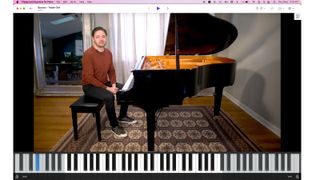
Playground transgressions
Although the app is a fun and practical approach to learning the piano, it's not without one or two niggles. Since we were using the app with a MIDI controller, we had to rely on the app's own piano sound - which is a bit tinny and has way too much reverb by default for this reviewer’s taste. The samples are obviously trimmed down to save memory space, with prominent looping audible within sustained notes.
Of course, if you are using a digital piano or home keyboard, then you can use your own instrument's sounds, which we guarantee will sound better. Playground Sessions tell us that 90% of its users rely on their own sounds rather than the app's own piano sound. That said, we'd like to hear PG improve this in the future so it's at least a viable option for those that want it.
Meanwhile, the app doesn't seem to interpret note duration - as long as you hit the right note at the right time, it turns green, but doesn't penalise you if you don't hold the note for the required amount of time. Playing dynamics are also ignored - although the piano sound is velocity-sensitive, the app takes no heed of it. This is a common issue with most interactive online learning services, however, so it’s certainly not a drawback that’s unique to Playground Sessions, but something worth mentioning.
Playground Sessions review: Verdict
Now, while we had a minor issue with the quality of the onboard sounds, there's actually a great deal of useful content here wrapped up in a fun and practical package.
Although aimed squarely at novice players, a lot of the content in the Courses section is very helpful for intermediate to advanced players - notably the 20 Hanon exercises for improving dexterity and finger independence, which are a very worthwhile addition for any level of player.
Of course, we'd like to see an upgraded built-in piano sound in the future, but PS nonetheless remains a solid, usable, and very well-rounded solution for learning the piano, and is well worth checking out for all levels but especially good if you're a total beginner.
Playground Sessions review: Specification
- Price: 7 day free trial, 1 month for $24.99, 12 months for $149.99, Lifetime for $349
- System requirements: iOS, Mac, PC
- Courses: Bootcamps: Rookie, Intermediate & Advanced, Additional Bonus Courses
- Format: Interactive lessons, some with introductory video, song library
- Song Library: Over 2,000 songs, unlimited free access to subscribers
- Contact: Playground Sessions
